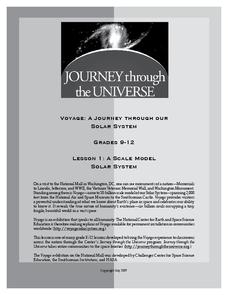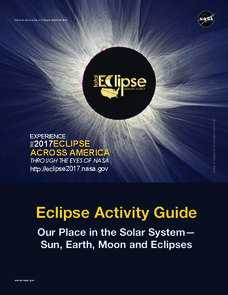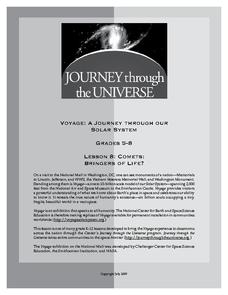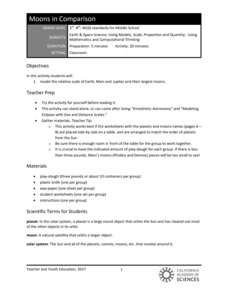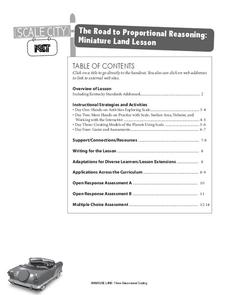PBS
Map a Model Solar System
Creating a solar system map is a snap thanks to a hands-on activity! Science scholars explore the solar system by building it wherever they choose during an interactive from PBS's Space series. Users pick both the location and scale for...
Journey Through the Universe
The Voyage Scale Model Solar System
Young scientists learn how to select a scale factor for a large scale model. Then they figure the scale for each of the planets and the distance between them. Finally, they construct a giant scale model of the solar system and answer...
Curated OER
Making Models of the Solar System
Learners make several models of the solar system to learn the positions of the planets in the solar system as well as relative distances and sizes. Creation of these models will help them identify the planets by size, shape, color,...
Curated OER
Scale Model of the Solar System
Young scientists gain a better understanding of space, the solar system and its vastness by creating a scale model. Students first need to calculate the distance between each of the nine planets according to the size of their scale. This...
Curated OER
Tour of the Solar System
Learners engage in science, math, and language activities as they do research on the components of the solar system. The class begins with some anticipatory activities and discussions before it is divided into small groups to conduct...
Laboratory for Atmospheric and Space Physics
A Classroom Solar System
Create a scaled model of our solar system in your classroom! Scholars work collaboratively to build paper mache planets and hang them in their proper position to showcase each planet's location in the solar system.
media.yurisnight.net
Science Lesson Plan: Our Solar System: I Wonder?
Ever wonder why Pluto isn't considered a planet? Or how large the Earth is compared to the other inner planets? Explore the universe with a series of projects that simulate different aspects of our solar system. The activities require...
Voyage Solar System
Round and Round We Go — Exploring Orbits in the Solar System
Math and science come together in this cross-curricular astronomy lesson plan on planetary motion. Starting off with a hands-on activity that engages the class in exploring the geometry of circles and ellipses, this lesson...
Research Parent
Solar System Cards
Find all things solar system in a set of reference cards. Even Pluto makes an appearance! Each of the 24 cards has a picture and accompanying informational text that gives brief background about the object.
Teach Engineering
An Inflated Impression of Mars
Help your class understand the magnitude of the distance between Earth and Mars with an activity that asks small groups to use balloons to create scale models of the Earth, Moon, and Mars. Class members figure out the distances...
Journey Through the Universe
A Scale Model Solar System
Between the time scientists discovered Pluto and reclassified it as a dwarf planet, it did not even make one full revolution around the sun. In two activities, scholars investigate scale models and their properties. Pupils find that it...
Curated OER
Scale Activities
How do you put something as large as the universe in perspective? Use a series of scale experiments. Classmates collaborate around four experiments to examine the scale of the earth-moon system, our solar system, the Milky Way galaxy,...
NASA
Eclipse Activity Guide
Ever made solar s'mores? Or recreated the solar system using peanuts? Astronomers young and old investigate all things solar using a variety of activities. Explore how the sun works, types of light it emits, and methods of charting the...
Journey Through the Universe
Comets: Bringers of Life?
Young scientists investigate the elements found in our solar system and then construct a model of a comet. They apply their new knowledge to the formation of the solar system.
Laboratory for Atmospheric and Space Physics
Planetary Distances on the Playground
There's no need to stay inside; get out of the classroom and create a scaled map of the solar system on your playground field! In collaborative groups, scholars identify the distance between the sun and other planets, place planet...
California Academy of Science
Moons in Comparison
Just how big is Earth's moon? With a hands-on simulation, scholars use Play-Doh to model the sizes of the planets Earth, Mars, Jupiter, and their moons. They make predictions as a class, work together to make their models, and discuss...
Space Awareness
Meet Our Neighbors: Sun
The sun isn't just a ball of yellow! Young scientists learn about the features of the sun using a hands-on modeling activity. They build models of the sun using common household items to represent sunspots, solar prominence, and the...
University of Colorado
Looking Inside Planets
Researchers use scientific data to understand what is inside each of the planets. The first in a series of six, this lesson builds off of that concept by having pupils use a data table to create their own scale models of the interiors of...
Kentucky Educational Television
The Road to Proportional Reasoning
Just how big would it really be? Young mathematicians determine if different toys are proportional and if their scale is accurate. They solve problems relating scale along with volume and surface area using manipulatives. The...
Space Awareness
Measure the Solar Diameter
Scientists could measure the diameter of the sun before they knew its distance. Scholars construct a simple mirror box to measure the diameter for themselves. They compare this measurement with the official size, listed in a...
Columbus City Schools
Moon Phase Mania
Now you see it, now you don't. Our moon seems to pull a disappearing act from time to time—but why? Take your seventh grade scientists above and beyond to discover the truth about the moon and the role it plays in Earth's little...
Space Awareness
Making A Sundial
Can people really measure time just by using the sun? Scholars venture outside on a nice, sunny day to build sundials and learn how people measured time 600 years ago. The class builds two different sundials while gaining practice with...
Journey Through the Universe
Going through a Phase
Ignore the full moon, it's just a phase. Young scholars observe and record the moon during a full cycle before learning to predict future phases. Then the instructor leads a discussion on the other solar system objects that...
NASA
Development of a Model: Analyzing Elemental Abundance
How do scientists identify which elements originate from meteorites? Scholars learn about a sample of material found in a remote location, analyzing the sample to determine if it might be from Earth or not. They study elements, isotopes,...










